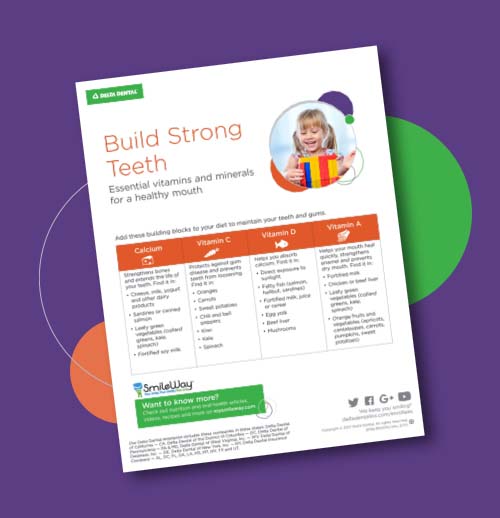7 vitamins and minerals your mouth needs

Did you know that a good diet is a key part of your oral health? Make sure your diet features these seven nutritional building blocks, which are essential for your dental health.
-
Calcium
No surprises here — calcium is well known to be great for your teeth. Throughout the body, calcium helps build bones and provide structural support. In your mouth, this mineral helps harden your tooth enamel and strengthen your jawbone.
-
What to eat
Milk, cheese and yogurt are good sources of calcium. If dairy doesn’t work for you, broccoli, carrots and salmon are also good choices!
-
Vitamin D
Vitamin D helps your body absorb calcium while boosting bone mineral density, so it’s crucial to get an adequate amount of vitamin D to get the most out of your calcium intake.
-
What to eat
Your body naturally makes vitamin D when it’s exposed to sunlight, but the vitamin can also be found in fatty fish, canned tuna and portabello mushrooms. You can also look for foods and drinks that have been fortified with vitamin D, such as milk, orange juice and cereal.
-
Potassium
Like vitamin D, potassium improves your bone mineral density. It also works with magnesium to prevent your blood from becoming too acidic, which can leach calcium from your bones and teeth.
-
What to eat
Bananas are well known sources of potassium, but they’re not alone. Other fruits and vegetables with high levels of the mineral include Lima beans, tomatoes, Swiss chard, potatoes, sweet potatoes, avocados and prunes.
-
Phosphorus
Phosphorus is a mineral that’s present in your bones, teeth and even your DNA! It works with calcium to create hydroxyapatite, the main structural component of bones and tooth enamel.
-
What to eat
Luckily, phosphorus is found in a wide range of foods. Rich sources of the mineral include seafood, such as scallops, sardines, cod, shrimp, tuna and salmon. You can also find it in beef, pork and cheese. If you’d prefer to get your phosphorus from plant-based foods, consider soybeans, lentils and pumpkin seeds.
-
Vitamin K
Think of this vitamin as a shield — it helps block substances that break down your bone. It also helps your body produce osteocalcin, a protein that supports bone strength. A vitamin K deficiency can also slow down your body’s healing process and make you more likely to bleed.
-
What to eat
Chowing down on leafy greens, such as kale, collards and spinach, can help you meet your vitamin K quota. Other great sources include parsley, broccoli and brussels sprouts.
-
Vitamin C
Vitamin C strengthens your gums and the soft tissue in your mouth. It can protect against gingivitis, the early stage of gum disease, and can prevent your teeth from loosening. Did you know that many animals (like elephants and dogs) create vitamin C in their bodies, even though humans can’t?
-
What to eat
You probably already know that citrus fruits are rich in vitamin C, but you can also find it in potatoes and leafy greens.
-
Vitamin A
Vitamin A contributes to your immune functions, vision and saliva. It helps your mucous membranes stay healthy, which prevents dry mouth and helps your mouth heal quickly.
-
What to eat
For strong gums and teeth, load up on fish, egg yolks and liver. You can also find vitamin A in leafy green vegetables such as spinach, kale and collard greens, or in oranges or other orange-colored foods: Think apricots, cantaloupe, pumpkin, carrots and sweet potatoes. These fruits and veggies contain high levels of beta-carotene, which your body converts into vitamin A.
Getting these vitamins and minerals is important. However, watch out for over-the-counter vitamin supplements. The Food and Drug Administration isn’t authorized to check vitamins for safety or accuracy before they’re in the marketplace, so the amount of a specific vitamin or mineral that’s advertised in a capsule could be incorrect.
Instead, try to eat a healthful diet that offers a variety of nutritious vitamins and minerals. If you’re considering taking supplements, consult your physician first.

Last updated January 18, 2022
Related articles:
The oral health information on this website is intended for educational purposes only. Always consult a licensed dentist or other qualified health care professional for any questions concerning your oral health.


